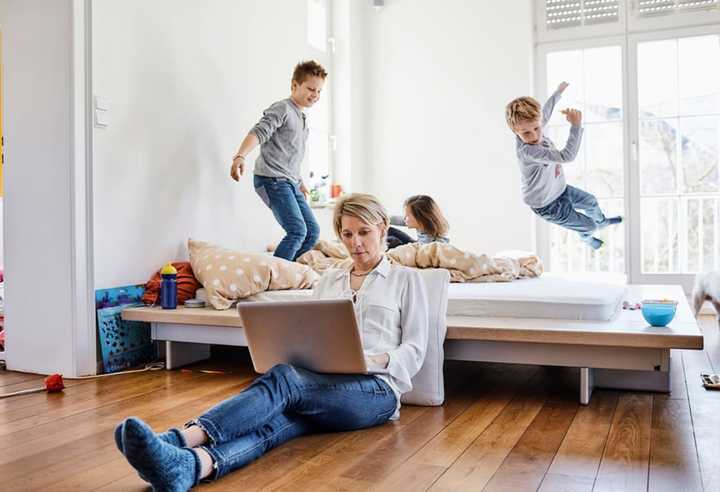The reality more likely includes a garbled conference call, a barking dog, one sticky kid smearing jelly on your spacebar and another screaming for screens—all while you fumble, and fail, to mute your line fast enough and get your work done. You find yourself wishing you had the poise, and fast-acting spouse, of Professor Robert Kelly, who is now famous less for his expertise on South Korean politics and more because his children crashed his televised BBC interview.
Of course, the novel coronavirus—now also known as COVID-19 and characterized by fever, cough, and shortness of breath—is serious business, and businesses are taking it seriously. Major sporting organizations like the National Basketball Association (NBA) and National Hockey League (NHL) have canceled or suspended their seasons. Music festivals are being canceled. Supply chains are at risk for disruption. And many employers are scrambling to figure out how to minimize the damage while also keeping the work chugging along.
So now, more and more organizations are exploring or moving to a remote model of work, allowing employees to complete their duties outside of the office with laptops, cellphones, virtual meetings, and other tools. But few employers are considering how challenging this change might be for the employees themselves.
Maybe you’ve never worked from home before. Maybe you lack clear guidelines, policies, and expectations about a work-from-home set-up. Maybe you’re concerned about being socially isolated. Maybe you aren’t sure how to manage the inherent distractions. Maybe you’re going to have children nipping at your heels, making productivity seemingly impossible. Maybe you’ve worked from home before—and it didn’t go very well.
Never fear. With the help of Dr. Victor Fornari, director of the division of child and adolescent psychiatry at Northwell Health’s Long Island Jewish Medical Center, we can help make the work-from-home arrangement work for you. Here are some tips:
Create a safe space.
Try to set aside space in your home for an office. Maybe it’s the guest room, since you’re less likely to host during the pandemic. One writer suggested the bathroom. Or maybe you could try your kitchen, though if you set up shop on the counter, you’ll likely be distracted by dishes and meals. Make sure that whatever area you choose is comfortable, relatively quiet, and offers some amount of privacy; a locking door is preferable (just ask Professor Kelly). “You want to minimize interruptions and try to be productive,” Fornari said. “Think about creating a space that will really allow you to do what you need to do.”
Go about your business.
Consider sticking to a schedule similar to the one you keep in the office. So if you typically work from 8:30am to 5pm with a one-hour break for lunch, try maintaining that routine. It will help you to remain on task. Make sure you have on hand the things that you associate with a productive workday—maybe it’s coffee, or high-protein snacks, or a fully charged phone. Keep to your regular schedule of meetings and interactions, even if they can’t be face-to-face. And ask your supervisor to continue to share with you a list of clear expectations and goals.
Get dressed.
You might also want to change out of your pajamas. “For most people the routine of getting up, showered, and ready for the day is very helpful,” Fornari said. “It organizes you for the rest of the day. You’re getting yourself in gear and telling yourself, ‘I’m at work.’” It also means you’ll be ready if the boss surprises you with a videoconference call.
Cut the noise.
Employ a white-noise machine, or use a similar app on one of your devices, to help drown out distractions inside and outside of your house. If your children are old enough to understand, remind them that you are not to be disturbed during certain hours. If you have an important call, consider hanging a sign on your home-office door to indicate that this is a particularly bad time for a long chat about Minecraft or for shrieking about snacks.
Give yourself a break.
Sometimes, when working from home, it can be challenging to know when to put things on pause. The work is always there, even in the middle of the night. But make sure you take breaks. Without them, you’ll risk burnout and lower-quality output. And if you are sick, with the coronavirus or anything else that feels debilitating, take a sick day. “Recognize that if you’re at home, you’re still allowed to be sick,” Fornari said. “You’re entitled to not work if you’re not feeling well, and to take a sick day.”
Be realistic.
There is no denying that, when teleworking, you are likely to get sidetracked, at least occasionally, by what’s going on around you: kids requiring attention, laundry calling out for folding, delivery-people ringing the doorbell. If you have children and can afford to hire a babysitter (assuming they aren’t quarantined), that is your best bet. But for many people, this would present an unexpected and, in some cases, unreasonable expense. So just do the best you can. “It’s hard to really plan and know exactly what this is going to be like until you do it,” Fornari said. “Working from home presents special challenges.”
Next Steps and Useful Resources
- Is stress contagious? What you need to know.
- Coronavirus: What an infectious disease specialist wants you to know.
